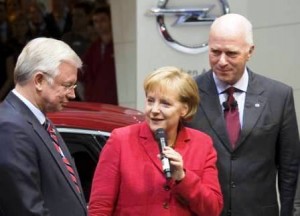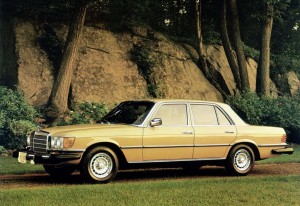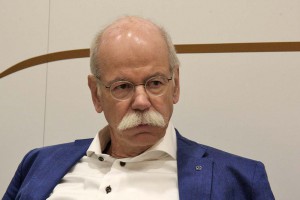
German Chancellor Angela Merkel, center, is pressing German automakers for a solution for cleaner diesels.
With driving bans aimed at diesel engines looming in several German cities, German Chancellor Angela Merkel is pressing German carmakers for help in coming up with ways to make vehicles cleaner while avoiding limits on traffic, averting a potential political crisis that could threaten her government.
The government, however, is yet to come up with a specific plan though it indicated some progress is being made after a high-level meeting in Berlin attended by Volkswagen AG CEO Herbert Diess, Daimler AG CEO Dieter Zetsche and BMW AG chief Harald Krüger, Finance Minister Olaf Scholz and Minister of Transport Andreas Scheuer also took part in the deliberations at the Chancellery, according to German press accounts
Scheuer indicated carmakers rejected expensive hardware retrofits of diesel vehicles that had been suggested for vehicles from the emission class Euro 5. Reports from German regulators have described the retrofits as “technically feasible and economically justifiable.”
However, Merkel, long a champion of the economically powerful auto industry who has cultivated close ties with major German automakers, has been reluctant to call for retrofits of cars now on the road with cleaner engines. Moreover, clean air advocates in Germany have said retrofitting older models would not fix the problem in major cities where the pollution levels now exceed European standards.
(Hamburg, Germany becomes first European city to ban older diesels. Click Here for the story.)
In addition, financial incentives aimed at getting consumers to scrap old diesel cars for new models may not have that much impact on air quality in major German cities, which are under growing pressure from environmentalists to cap the pollution.

Mercedes diesels were wildly popular in the 1970s and '80s, and they are welcome in Hamburg, Germany.
An exchange premium would in the optimistic case only bring about a reduction in nitrogen oxide pollution by less than 1 microgram per cubic meter of air, according to an internal paper by the Germany’s Federal Environmental Agency.
Environmentalists also expressed concerns that the incentives could increase the sale of vehicles using gasoline as fuel would raise the level of carbon dioxide, a greenhouse gas that contributes to global warming.
In addition, the question of who would finance an incentive program, the German government or German carmakers, remain unresolved.
If incentives are adopted, they should not be subsidized by taxpayers’ money and should only apply to new vehicles meeting the strict Euro 6d standard, which will go into effect next year, recommend experts at the Federal Environment Agency.
(Click Here to see why Daimler remains committed to diesel use.)
However, pressure is increasing for the government to adopt Germany-wide measures against dirty air due to excessive nitrogen oxide pollution in many municipalities, including Stuttgart and Munich.

Dieter Zetsche, Daimler AG chief, along with other leaders have been drafted by Merkel to resolve the diesel pollution problem.
Up until now, Merkel has supported the industry solution for cheaper – and less effective – software updates. German cities also have introduced their own measures, including speed limits on major traffic arteries and promises to buy cleaner buses, in a bid to bring air quality within EU limits.
But German environmental groups have taken dozens of cities to court and judges have already imposed the first bans on diesel vehicles. Further court-ordered bans are looming that will affect millions of German commuters and businesses.
The threat of driving bans also has become an issue for Merkel allies facing state elections in Hesse, where Frankfurt is the largest city, and in Bavaria the home of BMW.
(To see more about the German court ruling allowing a ban on diesel engines, Click Here.)
Earlier this month a court ruled that Frankfurt, the largest state in Hesse, must ban polluting older diesel and petrol vehicles from the city center from February to improve air quality.
